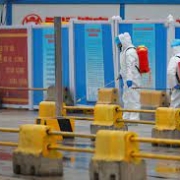Three new studies have been released—but not yet peer-reviewed—that support the wet market theory about the origin of COVID-19.
The head of the World Health Organization said on Feb. 5 he had discussed with Chinese Premier Li Keqiang the need for stronger collaboration on the origins of COVID-19, a subject of controversy that has strained Beijing’s relations with the West.
The controversy surrounding Covid-19’s origin continues to heat up, as the National Institutes of Health’s recent removal of genetic data about the novel coronavirus virus from the NIH archive was brought into the spotlight.
World Health Organization investigators have attempted to return to the Wuhan lab but are now being blocked by the Chinese government.
China rejected on July 22 a World Health Organization (WHO) plan for a second phase of an investigation into the origin of the coronavirus, which includes the hypothesis it could have escaped from a Chinese laboratory, a top health official said.
Delta variant behind more than 80% of U.S. cases, Fauci says
China, COVID-19 cases, Covid-19 Variants, Delta Variant (B.1.617.2; India), Dr. Anthony Fauci (Director), Government, India, National Institute of Allergy and Infectious Diseases (NIAID), National Institutes of Health, Senate, United States, WuhanThe Delta variant of the coronavirus is the cause of more than 80 percent of new U.S. Covid-19 cases, but the authorized vaccines remain more than 90 percent effective in preventing hospitalizations and deaths, said top U.S. infectious disease expert Anthony Fauci during a U.S. Senate hearing on July 20.
Sinopharm’s Covid-19 vaccine elicited weaker antibody responses against the Delta variant, based on the first published study of its effect against the more contagious version.
The head of the World Health Organization said on July 15 that investigations into the origins of the Covid-19 pandemic in China were being hampered by the lack of raw data on the first days of spread there and urged the country to be more transparent.
The virus that causes Covid-19 could have started spreading in China as early as October 2019, two months before the first case was identified in the central city of Wuhan, a new study showed on June 25.
Genetic sequences from more than 200 virus samples of early Covid-19 cases mysteriously disappeared from an online scientific database. A researcher in Seattle reported the recovery of 13 of those original sequences.










